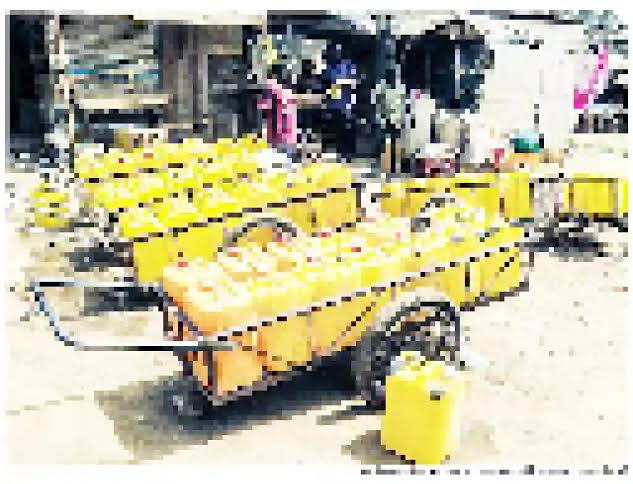Undocumented migrant workers from Niger Republic are providing solution to water scarcity challenge in suburbs of Nigeria’s federal capital city, Abuja. Michael Oche writes
In search for a better life, just like most migrants across the world, many Nigeriens leave their homes for neighbouring Nigeria. These hardworking men though undocumented, are making life easier for residents of Abuja suburbs by closing the gap of water scarcity.
Like most Nigerian towns and cities, lack of access to portable water supply remains a major problem for many households in FCT suburbs. In Nigeria for instance, more than 60 million people (40 percent ) are required to meet SDGs target for improved drinking water supply.
To cover this inadequacy in water provision by the government in many cities and particularly in the FCT, non-state providers of water (NSPs) such as water vendors popularly known as Mai Ruwa are coming to the rescue.
Checks by Nigerian Pilot showed that many homes in suburbs of Nigeria’s Federal Capital City, get their water supply from these water vendors, majority of whom are migrant workers from Niger Republic
These water vendors, though undocumented migrants, make brisk business especially during the hot season which is accompanied by scarcity of water because, most households could afford to sink boreholes.
Checks by this reporter revealed the presence of hundreds of migrant water vendors from Niger Republic and Malians in different parts of Abuja suburbs. They are seen in droves in, Kubwa, Nyanya, Lugbe, Tunga Maje, Zuba, Gwagwalada, Kuje, Gwarimpa to mention but a few.
Due to the cultural similarities with people from northern Nigeria, it is difficult to differentiate between these migrants water vendors from other vd northern part of the country, owing largely to the cultural similarities between these countries and ours. With this, it often not difficult for them to blend in with the Hausa speaking communities in the suburbs. Niger Republic shares boundary with northern states in Nigeria such as Sokoto, Katsina, Kebbi and Jigawa.
One of the leaders of the migrant community in Kubwa disclosed that they are making thousands of naira which they send home to poor family members back in Niger.
Samaila Biliya, a migrant told this reporter that he is from a region called Damagaram in Niger republic.
Samaila said he came to Abuja in 2013 after being invited by a brother who had migrated earlier. His brother made money pushing water truck and had even managed to a open a little kiosk where he sells GSM recharge cards, cigarettes and soft drinks.
He told this reporter that his dream is to own his kiosk. Though, he admits it will take a few years to save money as meeting te demand of his immediate family back home has prevented him from saving much.
A truck of water in kubwa area where he operates cost N250. He makes an average of N2000 daily and pays the truck owner N500. He said they hire the trucks until they are able to buy theirs. The truck cost N15,000.
He, along with other of his friends sleep in a tea shop (known as mai shayi) owned by his compatriot from Niger. The shop is made with zinc and they have to sleep on a wooden table. He said staying in a shanty is a price he has to pay to ensure that his family back home has a better life.
In his words, “Pushing the water truck is not easy. But back home, families expect a lot from us. So we have to work hard. One day, I want to own my own kiosk like my brother. I hear there is money from okada (commercial motorcyclists). But it’s not always easy finding someone to trust you with their motorcycle”
Residents of kubwa who spoke to Nigerian Pilot said the vendors have provided relieved as it would have been difficult sourcing for water, especially during dry season.
Ifeoma Sunday, a resident said, “we don’t have borehole so you can imagine how it will be like if not for these mai ruwas. I buy water from them and some of them have become my friends.”
Said she has no problem patronising the water vendors and find them trustworthy
Another resident, Julaina Okon said, “I didn’t even know they are not Nigerians. But they have indeed come to our rescue here. The borehole is far from my home, so I rely on them for my water need, especially water to wash and cook.”
Like Samaila, other migrants water vendor who spoke with this reporter said they entered into Nigeria through the many porous borders. They however admitted it is usually not easy, explaining that sometimes they are arrested by immigration officials and kept in camps.
“Before the Buhari led government, it was really difficult for us to enter into Nigeria as the Nigeria immigration use to arrest and detain us and sometimes put us in a camp at Gwagwalada,” Suleiman Ahmed, another water vendor from Niger Republic told this reporter.
Another migrant, Rabiu Ibrahim said many of them come to Nigeria to make money for their families.
He said the major occupation back home is cattle rearing and farming. He even boasted that most of the beef consumed in Nigeria are imported from their country.







